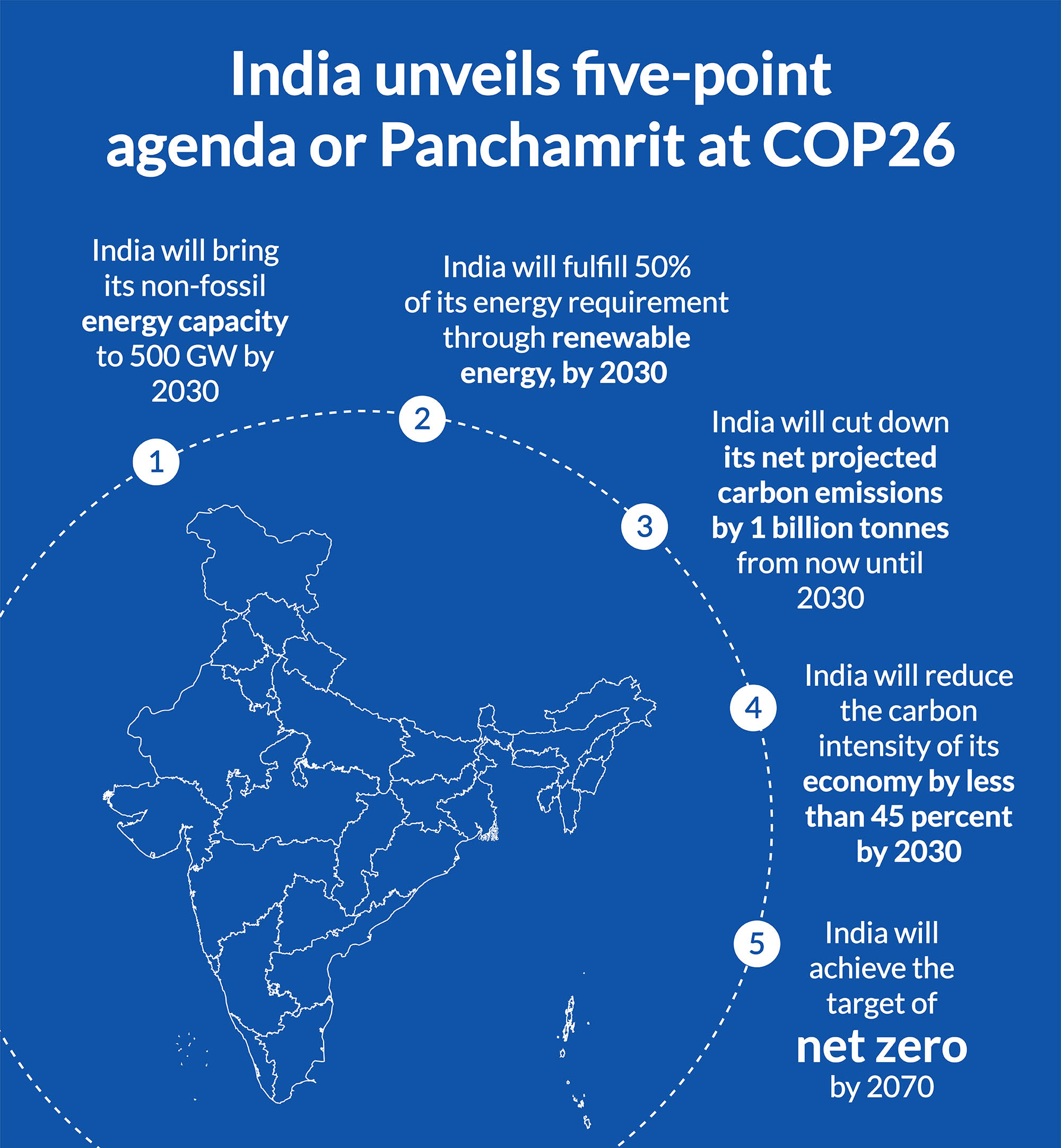Energy and climate change are at the forefront of the many challenges being faced by India today.
India is one of the fastest growing economies in the world. At the core of this growth is the question of energy — more precisely, our overall energy consumption and our reliance on fossil fuels— which has led to rising GHG emissions and a warming climate. Globally, the use of energy represents by far the largest source of greenhouse gas emissions from human activities. In India, the energy sector is the largest emitter of greenhouse gases, being responsible for 67 % of total GHG emissions (excluding Land Use, Land-Use Change and Forestry-LULUCF).
The resulting impact on climate is poses severe risks for India’s economy, ecosystems, and human health.

A possible reversal of development gains made by India:








Note: The source studies each adopt different methods, baselines and timeframes.
Our use and production of energy have a massive impact on the climate. The way forward to clear. India must use energy efficiently while embracing clean energy sources in order to grow sustainably and tackle climate change.
This is our chance to build a clean future underscored by the principles of climate justice and equity
In curbing emissions and adopting clean energy pathways, India has advantages, especially the upliftment of the living standards of the population driven by improved access to transportation, cooking fuel, comfort heating or cooling and access to modern energy services. Greater access to clean energy will fuel new jobs and create a dynamic new economy.
India must decarbonize more, and fast, and sectors like power, industry, and transport, hold immense potential. Given India’s high vulnerability to climate change, driving adaptation at scale across critical systems like agriculture, water and coastal infrastructure can build resilience and strengthen communities.
At the heart of the clean energy transition is the opportunity for a sustained commitment to equity, justice, and inclusion. The nature of the Indian economy, where informal workers account for 90 percent of the workforce, requires that the re-invention of energy pathways be a socially responsible exercise. Around 1.2 million people are employed in India’s coal sector, and additionally, a large unaccountable informal economy is attached with the coal sector that heavily depends on it for livelihood. The question of a “just transition” therefore becomes extremely important– not only to help protect India’s most vulnerable populations from climate impacts, but also to create job and alternative livelihoods opportunities for communities and people affected by the decline of fossil-fuel dependent industries.
The development choices that India makes today will be of immense importance. As a country facing the challenges of bringing its citizens out of poverty and fostering development, India can deliver economic growth that is clean, sustainable and inclusive. The choices are stark, the consequences profound.
The science is clear. The coming decades are the planet’s last chance to keep global warming below 1.5°C before the end of the 21st century. Countries will need to take drastic and immediate steps to tackle the most catastrophic impacts of climate change.
Although India’s relatively low per capita and historical CO2 emissions mean that it carries little historical responsibility for climate change, it is, nonetheless, currently the third-largest emitter of CO2 in the world, mostly due to its substantial demands for energy required to drive economic development. But India has taken massive strides in climate action – from running one of the largest and most ambitious renewable capacity expansion programs in the world, to spearheading global climate partnerships.

Stepping up climate cooperation, India and France launched the International Solar Alliance (ISA) during COP21. India was central to the formation of the Kigali Amendment, which enables the gradual phase-down of high GWP hydrofluorocarbons, or HFCs.
According to estimates, India is the only major country to be on track to achieve its targets set out in the landmark Paris climate agreement, India is largely on track to meet, and even exceed, its Paris Climate Agreement targets: reduce emissions by 33 to 35 percent of its gross domestic product (GDP) by 2030 from 2005 levels and achieve 40 percent of installed power capacity from non-fossil fuels by 2030.
India has always had an important role to play in COP negotiations but at COP26 announced far-reaching ambition on a scale of never before. In response to the urgent need for newer, bolder action, India announced an ambitious five part “Panchamrit” pledge – which are a critical foundation in the global pathway to achieving the ambitious 1.5˚C global warming target.
The goals have been set. But without concrete action, the way forward looks daunting. Practically speaking, India’s commitment of net zero means phasing out coal, which fuels 70% of our electricity, switching to electric vehicles, decarbonizing polluting industries like cement and steel, creating forests to absorb carbon dioxide, and installing more solar power plants, all in the next few decades. This is even as India continues on a path of economic growth and urbanisation. Less than 50% of the infrastructure India require to be developed has yet to be built. Millions of vehicles will added to India’s roads in the next two decades; and energy demand will increase massively.
Much of India’s net zero success also hinges on access to finance. India will need billions of funding in clean technology and infrastructure that the government, which we cannot afford on our own.
Clearly there is a lot to be done. What we need would be strategic planning, scientifically designed policies, and strict implementation of sectoral and thematic priorities. Climate actions will also need to be fast-tracked and supported at the sub-national level. Policy makers have to do their part, but so do CSOs, businesses, private investors, and citizens. Concerted action and collaboration involving the widest possible range of actors is crucial if we want to overcome the toughest climate challenges we face today.
Shakti Sustainable Energy Foundation plays a vital role in supporting this crucial consensus and enabling forward-thinking solutions. Our role is to identify and scale energy system interventions that will reduce GHG emissions to align with a 1.5°C future and address the climate crisis.